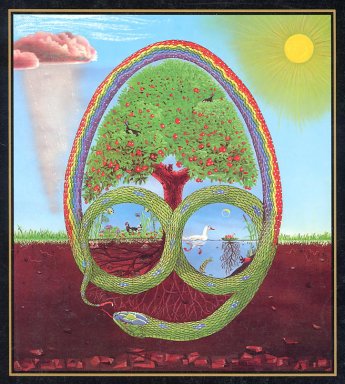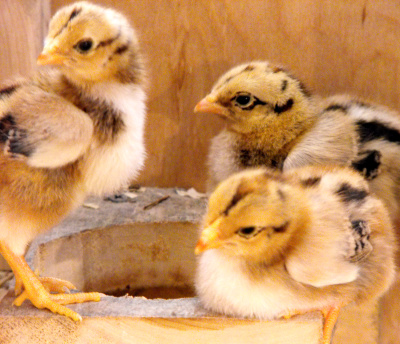
Permaculture at home
 You keep talking about
permaculture, and it does sound cool. But it's so
complicated! What are a few simple permaculture steps I can take
around my own home or farm?
You keep talking about
permaculture, and it does sound cool. But it's so
complicated! What are a few simple permaculture steps I can take
around my own home or farm?
Introducing permaculture into your life starts with
changing the way you think rather than with changing a specific
action. Like the natural ecosystems that permaculture is based
on, our man-made environments are so variable that no single answer
works for everyone. Instead, we need to take the central
permaculture principles and apply them to our own mini-ecosystems on
our farms or in our yards. Here are my top three favorite
permaculture concepts:
There's
no such thing as waste. Despite the 14 billion
tons of used materials that Americans deposit in landfills every year,
waste is more of a state of mind than a reality. Most of you
probably have a worm bin and/or compost pile to turn your food "waste"
into productive soil. Hopefully, you've also done away with paper
towels, swiffers, and anything else that is billed as a disposable. Permaculture
admonishes us to think beyond these basic steps and eliminate all types
of waste from our lives. Mark and I have a long way to go, but
we've started buying some of our
staples in bulk,
seriously cutting down on packaging. We're experimenting with growing
mushrooms on our junk mail and cardboard, and are also using these
"wastes" as decomposable weed barriers under mulch in the garden.
Our most recent step is harnessing
graywater from the kitchen sink to grow King Stropharia mushrooms. I'd love to hear what
your waste-free household looks like.
 Every aspect of your permaculture system
should have multiple functions. The earth is full of
non-human life, so we are ethically bound to make our homesteads
compact, leaving as much natural space as possible to house salamanders
and wildflowers. The trick to keeping your homestead small is
requiring each facet to serve multiple functions. For example, chicken
tractors allow you
to raise a useful food in the aisles of your garden or even in your
city lawn, while at the same time keeping your poultry healthier than
they would be in a coop situation and providing fertilizer for the
garden. Even if your neighborhood association restricts you to
only growing ornamentals in your front yard, why not intersperse
edibles (colored swiss chards and cabbages make elegant show-plants)
and focus on nectary
species to increase
the local population of beneficial insects? If you've got a
multiple acre farm, how about turning a few acres of woodland into a
multi-purpose forest
garden which will
provide your firewood, some fruits and nuts, and wildlife habitat all
at once?
Every aspect of your permaculture system
should have multiple functions. The earth is full of
non-human life, so we are ethically bound to make our homesteads
compact, leaving as much natural space as possible to house salamanders
and wildflowers. The trick to keeping your homestead small is
requiring each facet to serve multiple functions. For example, chicken
tractors allow you
to raise a useful food in the aisles of your garden or even in your
city lawn, while at the same time keeping your poultry healthier than
they would be in a coop situation and providing fertilizer for the
garden. Even if your neighborhood association restricts you to
only growing ornamentals in your front yard, why not intersperse
edibles (colored swiss chards and cabbages make elegant show-plants)
and focus on nectary
species to increase
the local population of beneficial insects? If you've got a
multiple acre farm, how about turning a few acres of woodland into a
multi-purpose forest
garden which will
provide your firewood, some fruits and nuts, and wildlife habitat all
at once?
Focus
on perennials.
While I don't see any permaculturalists getting rid of their cucumber
and tomato plants, they do advocate using perennials instead of annuals
wherever possible. Perennial edibles generally require much less
input of organic matter, don't tempt you to till up the soil, and need
less maintenance. Perennials also tend to encourage wildlife and
discourage soil erosion, another example of multiple uses in a single
system.
I could go on and on for
hours, but I'd rather hear about your own experiences. Which
permaculture concepts have you applied to your life?

Want more in-depth information? Browse through our books.
Or explore more posts by date or by subject.
About us: Anna Hess and Mark Hamilton spent over a decade living self-sufficiently in the mountains of Virginia before moving north to start over from scratch in the foothills of Ohio. They've experimented with permaculture, no-till gardening, trailersteading, home-based microbusinesses and much more, writing about their adventures in both blogs and books.
Want to be notified when new comments are posted on this page? Click on the RSS button after you add a comment to subscribe to the comment feed, or simply check the box beside "email replies to me" while writing your comment.

Sara -
Doesn't sound like a disposable anymore to me --- nicely done!
I hate cleaning and just don't clean. I knew there was a better way.